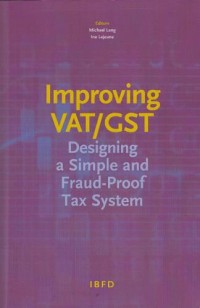
Book
Improving VAT/GST: Designing a Simple and Fraud-Proof Tax System
As governments worldwide are looking for ways to raise revenue in order to finance their budgets, consumption taxes such as value added taxes (VAT) and goods and services taxes (GST) are increasing in prominence and now exist in over 150 countries.rnrnImproving VAT/GST: Designing a Simple and Fraud-Proof Tax System compares the VAT/GST systems of 15 countries around the world, with all continents represented, plus the EU VAT regime. The analysis is organized in a way that allows interesting and specific details of each VAT system to be identified, while at the same time rendering them comparable despite their structural differences. In detail, it examines topics such as neutrality, VAT groups and head office (including branch transactions), financial services, anti-avoidance rules, advance rulings, VAT gap, compliance costs and costs of collection. It identifies best practices and provides readers with some thoughts on future directions of VAT/GST. The main focus is set on making VAT/GST systems both simple and fraud proof.rnrnThe relevant knowledge about different VAT/GST systems provided in this book can be a fundamental resource to help practitioners to optimize their tax planning solutions, to provide legal certainty to their clients and to ensure the avoidance of both double taxation and double non-taxation in VAT/GST matters.rnrnThis book will be an interesting and valuable tool for both regulators and practitioners alike to deepen their understanding of the various tax systems and the way certain issues are solved under different regimes, in order to encourage international trade and lay the groundwork for the removal of tax obstacles and related costs in global commerce.
Detail Information
| Call Number |
04 IMP mic
|
|---|---|
| Publisher | IBFD : The Netherlands., 2014 |
| Collation |
xxx, 710 p.; 23 cm
|
| Language |
English
|
| Classification |
04 IMP mic
|
| ISBN/ISSN |
978-90-8722-236-9
|
| Edition |
-
|
| Subject(s) |






